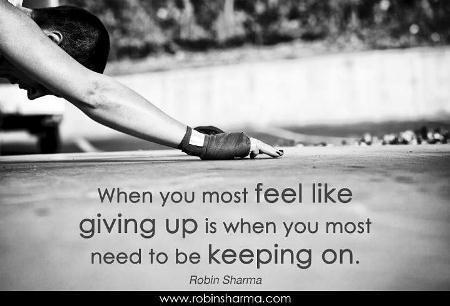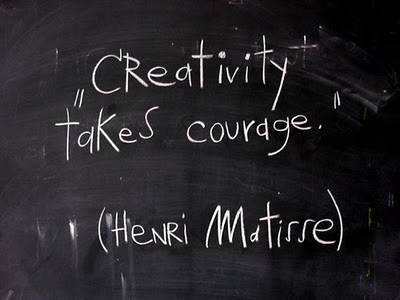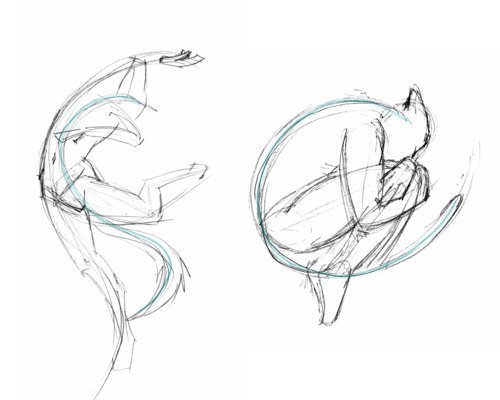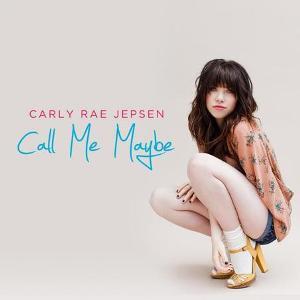Jeremie Averous's Blog, page 143
November 15, 2012
When you most feel like giving up… what should you do?
There is an interesting statement by Robin Sharma:

Are you keeping on?
“When you most feel like giving up is when you most need to be keeping on“. How much is that applicable?
The need to be persistent is a mantra of self-development books. And indeed, it is a very important parameters to beat the Resistance that tries to prevent us from creating anything new (re-read the “War of Art” blog post and the “The War of Art” book if you’re not sure any more about what is Resistance).
I have experienced it first hand in my entrepreneurial venture. I have decided to give it 2 years before deciding to continue or ditch it. And when I feel miserable, stressed and depressed I remember this (or my wife does remind me), which gets me back on track.
There are some instances, though, where it might be better to stop and start something new. They are rare. It is very difficult to identify these rare instances because Resistance tricks us into believing that any difficulty is candidate for stopping. To get a full review of this important issue, re-read “The Dip” by Seth Godin. From a practical perspective, here’s a useful and simple process:
define first some “breaking parameters and criteria” and write them down
Decide that you will stop if you reach those breaking parameters
Be very strict that you apply the exact parameters and criteria that you had written down a few months earlier
Be persistent. And know what are the rare instances where not to be.

November 13, 2012
Video of the quarter: Don Tapscott on the Collaborative, Open world
Revise your knowledge of the Fourth Revolution by watching this entertaining video by Don Tapscott that covers most of the basics (Don Tapscott is the author of Wikinomics: How Mass Collaboration Changes Everything and Macrowikinomics: New Solutions for a Connected Planet). It even speaks of the transition between Agricultural, Industrial and Collaborative Age!
I like how he considers the younger generation to be ‘natives’ of the collaborative Age while he is only an explorer!

November 10, 2012
How the Fourth Revolution is the era of the individual widget – even for drugs!
The Industrial Age was all about mass production and production for the bulk of the population. That was in particular the dominant economic model of big pharma. Rare diseases were not tackled for the lack of economic viability.
 Today this changes completely. Some biotech companies are extremely successful at making drugs for rare, orphan diseases. And social security or private insurance is happy to pay for the hefty price tag – because those diseases are so rare. In this great paper in Forbes, “How A $440,000 Drug Is Turning Alexion Into Biotech’s New Innovation Powerhouse”, we get a great insight into a new business model. A business model which addresses the needs of individuals at the fringe of the mass production model, while remaining profitable.
Today this changes completely. Some biotech companies are extremely successful at making drugs for rare, orphan diseases. And social security or private insurance is happy to pay for the hefty price tag – because those diseases are so rare. In this great paper in Forbes, “How A $440,000 Drug Is Turning Alexion Into Biotech’s New Innovation Powerhouse”, we get a great insight into a new business model. A business model which addresses the needs of individuals at the fringe of the mass production model, while remaining profitable.
As in many fields, the Collaborative Age is the Age of production for the individual of customized products. Pharma is just one example. The revolution in manufacturing will bring the same result – produce widgets one by one, on demand.
In the medical field, medicine is becoming more and more individualized. Genetic factors are increasingly taken into account before administering medicines or X-rays, as sensitivities vary. Soon we won’t get mass produced drugs but drugs specifically generated in dosage and type for our own case.
The Fourth Revolution is the era of narrow niches – so narrow that it addresses an individual. Are you still stuck in the mindset of mass production? Change now to understand the world as it transforms!

November 8, 2012
What really is stardom nowadays? Can’t you just be the star of your tribe?
In the article “How the internet killed Carly Rae Jepsen” on MTV hive, the author explains how Carly’s new album is (relatively) a flop. Is that contradictory with our recent post on her incredible viral summer success ‘Call me maybe?’ (“Done! The Fourth Revolution put the music industry upside-down!“?)
 I would like to argue that it is not because her album has a slow start start it does not mean that she will not succeed on the long term as a noticeable artist. Anyway she is now geared to participate to Justin Bieber’s concerts for the next few months. She is releasing videos and continuing promoting her work.
I would like to argue that it is not because her album has a slow start start it does not mean that she will not succeed on the long term as a noticeable artist. Anyway she is now geared to participate to Justin Bieber’s concerts for the next few months. She is releasing videos and continuing promoting her work.
But the most important thing is that the internet / social network age is all about tribes, and not necessarily mass consumption. Stardom in the industrial age was necessarily at the level of the entire population, of an entire country: you could not so much have several products competing for different sections of the population. Following country-level sales made sense. With the Fourth Revolution, this kind of stardom is doomed to extinction, or will at least be less important. Stars will be stars of smaller global tribes of a few million people scattered over the world. These tribes will often not be defined geographically but more by taste and lifestyle. A star’s influence can be greater through a tighter connection will less people than with a looser connection to everybody.
In any case Carly sold more than 100,000 albums – how many would-be singers would kill to achieve that? She might not be on the road to become a global star, but she certainly is building a strong base for success, within a certain tribe on which she will have a great influence. Will she manage to establish herself as a star for her tribe? Time will tell!
Hat tip to Laurent Riesterer for the link to the MTV hive article.

November 6, 2012
How the Fourth Revolution transforms the market for work
Our Industrial Age world is apparently in a crisis – employment rates diminish currently for most generations, and those who are employed are increasingly so on a part-time basis. The proportion of salaries in the net national value creation is diminishing.

Contract work – the new work framework?
Yes, the Industrial Age model of salaried work is in a crisis – not a crisis actually, but a transformation. Even the Harvard Business Review now blogs on “The Rise of the New Contract Worker”, or how increasingly people look for alternative forms of work. Not straightforward employment but rather innovative forms of work and compensation, which generally imply some sort of contracting or more or less informal grouping.
The portion of salaries in the economy will further diminish because more and more people will be contractors, on their own or in small ad-hoc companies. The inter-mediation cost has dropped dramatically with freelance platforms. When countries will give even more flexibility on such basic social services like health insurance, the proportion of freelance contract workers will only increase.
The salaried worker working exclusively for one single employer is dying. What will replace it might increase anxiousness for some because of the apparent risk and the need to market oneself; yet it will unleash the creativity of the world by making sure that all work that gets done really contributes to creating value.
An employment market crisis? Reframe it: it is just a deep transformation of the way we will get compensated for work! When do you start taking this opportunity?

November 3, 2012
Creativity takes courage. Are you ready to test your courage?
Yep, real creativity takes courage.

How courageous are you really?
Real creativity that is – creativity that is exposed to the looks, reactions and feedbacks of others. Being creative in one’s realm without sharing does not create anything for the world.
Are you really courageous? Ready to confront criticism and people making fun of you because you show them something which is outside the normal?
There’s just one way to know it. Create something and show it, publish it to the world. There you’ll know whether you can face your fears. You’ll know whether you’re courageous.
Be courageous. The world, your community, your family needs you to be.

November 1, 2012
People are more engaged by things that are suggestive than by things that are crystal clear
I love this sentence, because it is so true: “People are more engaged by things that are suggestive than by things that are crystal clear” – David Sibbet in his book “Visual Meetings“.

Even with a few lines, our mind interprets the image into something clear. By this creative mechanism we are much more engaged with the picture!
This sentence expresses what I have felt for a while. And that’s why now, in situations where the aim to get people engaged like meetings and workshops, I aim to give only hints, feeble patterns, or outright metaphors but not so much direct description of the issue.
It engages us when we need to do the creative effort of filling in the picture. And by that process what we will produce will be better, and ours.
So next time when you want a group to engage, only suggest. Don’t explain too clearly! And let the participants engage around the mystery of creation!

October 30, 2012
The Fourth Revolution in action: already baby steps towards direct democracy
We argue in The Fourth Revolution book that representative democracy is a remnant of the Industrial Age travel limitations and that forms of direct democracy will emerge as a result of the Fourth Revolution.

Ready to Ask Your Question to Your Representative?
Some hints of that shift can already be observed. The website AbgeordnetenWatch.de (literally Parliamentary Watch) in Germany is a website that connects citizens and elected representatives. According to David Eaves, a guru of open data, the German site has, since 2004, posed over 140,000 questions from everyday citizens of which 80% been answered by politicians. According to the website itself, in average, the website counts 10.000 Visitors a day and about three million page impressions per month; two thousand questions are asked through the portal of abgeordnetenwatch.de each month and questions and answers are visible to all visitors.
This type of websites will extend and become progressively central to our countries’ governance. Eventually citizen’s questions will be relayed in parliament and to government and answers posted in such forums.
The Fourth Revolution is coming quickly. Old-fashioned politicians beware!

October 27, 2012
Why do we consider that people can’t change their mind?
Recently another perverse effect of the fixed mindset became obvious to me as I was in the US watching a presidential election debate (but this can be observed in any country).
 Commentators and debaters alike spent their time referring to positions, votes, declarations, papers, etc written by the candidates in the course of their career. They used these references – sometimes decades old- to pinpoint inconsistencies in the declarations of candidates.
Commentators and debaters alike spent their time referring to positions, votes, declarations, papers, etc written by the candidates in the course of their career. They used these references – sometimes decades old- to pinpoint inconsistencies in the declarations of candidates.
A striking question that came to me is “why can’t people be allowed to change their mind?”. Why can’t we understand that in some instances, people do change their point of view? Of course you would not necessarily expect people to change fundamentally their values (or then very slowly). But on a number of issues, faced with new evidence and experience, people should be allowed to change their minds!
For example, a politician suddenly becoming president of a large, powerful country will certainly encounter experiences in this unique position that will lead him to reconsider certain of his beliefs or opinions. Still he/she is not to show any of this publicly. It is as if our society would not accept any growth and change from these people.
What is amazing is how difficult it is for us to accept that people can indeed change their mind on some fundamental issues. And this is probably caused by our ‘fixed mindset’ inheritance.
The next time someone you know dares say that he/she changed his/her mind on something important, support this person. It is tough to say this in our societies. Let change it and support growth and change. We collectively need it.

October 25, 2012
Done! The Fourth Revolution put the music industry upside-down!
This summer for the first time the ‘summer hit’ in the US came out of nowhere. That’s “Call me maybe” an infectious song (250 million views on YouTube). Well, that’s not exactly true: it came out of YouTube and social networks. The story is counted in this very interesting NYT article which I recommend to read.
 This song became a hit through a YouTube-twitter infection. And it is only with regret that the radio stations went on to play the title after a few weeks. For whom actually? It seems the young generation listen to music (for free) on YouTube anyway. Artists make money through public appearances and other means; not any more through broadcasting their songs. That’s a fact.
This song became a hit through a YouTube-twitter infection. And it is only with regret that the radio stations went on to play the title after a few weeks. For whom actually? It seems the young generation listen to music (for free) on YouTube anyway. Artists make money through public appearances and other means; not any more through broadcasting their songs. That’s a fact.
It goes to show how the traditional music industry is completely overtaken. It does not master the broadcasting channels that are important to the young people. It is the end of that industry as we knew it in the last decades.
And it is the beginning of viral hits. Funny videos, cool songs… Stay tuned! The Fourth Revolution has toppled the music industry and it is not the last institution that will go!
PS – listen to the song it’s really viral!




